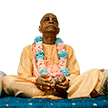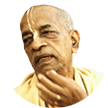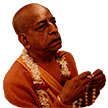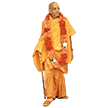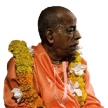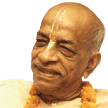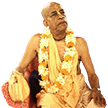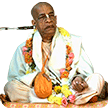Spiritual Identity - an essential subject: Difference between revisions
(Created page with "Category:Essential Subjects <!----------------------- edit below this line -----------------------> <!------------------------ begin introduction text --------------------...") |
(Vanibot #0041: Moves Choose Another box to the end) |
||
| Line 2: | Line 2: | ||
<!----------------------- edit below this line -----------------------> | <!----------------------- edit below this line -----------------------> | ||
<!------------------------ begin introduction text ------------------------> | <!------------------------ begin introduction text ------------------------> | ||
A living being has a spiritual identity, and therefore his occupational duty is also spiritual. Real dharma is that which is advised in Bhagavad-gītā: one must give up one's material occupational duties, just as one must give up his material body. Anyone who is unconscious, who is ignorant of his spiritual identity, identifying himself with this body and misusing this opportunity of human form of life simply for animal sense gratification, is wasting his human form of life. | |||
Srila Prabhupada's books, lectures, conversations and letters offer a comprehensive presentation of this essential subject as seen in the '''[[Vaniquotes:Category:Spiritual Identity| | Srila Prabhupada's books, lectures, conversations and letters offer a comprehensive presentation of this essential subject as seen in the Vaniquotes '''[[Vaniquotes:Category:Spiritual Identity|Spiritual Identity]]''' category. An introduction from his books is given below in the following 15 quotes. | ||
<!-------- end introduction text and don't touch next three lines ---------> | <!-------- end introduction text and don't touch next three lines ---------> | ||
---- | ---- | ||
== Quotes from Srila Prabhupada's books == | == Quotes from Srila Prabhupada's books == | ||
<!----------------- edit quote boxes below this line -----------------> | <!----------------- edit quote boxes below this line -----------------> | ||
{{VaniQuotebox| | {{VaniQuotebox|Living entities are fallible because when they come in contact with the material world they lack their spiritual identity, and thus the body materially obtained becomes subjected to birth, growth, transformation, situation, deterioration and annihilation|The living entities are fallible because when they come in contact with the material world they lack their spiritual identity, and thus the body materially obtained becomes subjected to birth, growth, transformation, situation, deterioration and annihilation under the laws of nature. '''(Śrīmad-Bhāgavatam 1.11.25)'''}} | ||
{{VaniQuotebox| | {{VaniQuotebox|Any literature giving information about the spiritual world, spiritual life, spiritual identity and the spirit soul is called para vidya|Any literature giving information about the spiritual world, spiritual life, spiritual identity and the spirit soul is called parā vidyā. Śrīmad-Bhāgavatam does not have anything to do with the materialistic way of life; it gives transcendental information to educate people in the superior system of parā vidyā. '''(Caitanya-caritāmṛta, Madhya-līlā 19.17)'''}} | ||
{{VaniQuotebox| | {{VaniQuotebox|Even after attaining knowledge of one's spiritual identity, if one does not come to the point of knowing that the living entities are eternal parts and parcels of the whole, one has to fall down again into the material atmosphere|The culture of knowledge reaches perfection only when the knower come to the point of surrendering unto the Supreme Lord, Vāsudeva. Otherwise, even after attaining knowledge of one's spiritual identity, if one does not come to the point of knowing that the living entities are eternal parts and parcels of the whole and can never become the whole, one has to fall down again into the material atmosphere. Indeed, one must fall down even if he has become one with the brahmajyoti. '''(Sri Isopaniṣad, Mantra 17)'''}} | ||
{{VaniQuotebox| | {{VaniQuotebox|Being freed from differentiations like man, animal, big, low, etc., one becomes purified in his consciousness and able to develop Krsna consciousness in his spiritual identity|After the destruction of the material body, the spirit soul is one. The spirit soul, due to contact with material nature, gets different types of bodies. When one can see this, he attains spiritual vision; thus being freed from differentiations like man, animal, big, low, etc., one becomes purified in his consciousness and able to develop Kṛṣṇa consciousness in his spiritual identity. How he then sees things will be explained in the next verse. '''(Bhagavad-gītā 13.31)'''}} | ||
{{VaniQuotebox| | {{VaniQuotebox|If the people of the world understood that the basic principle of life is spiritual identification, they would understand that the business of the spirit soul is to serve the Supreme Spirit, Krsna|The Kṛṣṇa consciousness movement is not based upon bodily designations. It is a transcendental movement on the platform of spiritual understanding. If the people of the world understood that the basic principle of life is spiritual identification, they would understand that the business of the spirit soul is to serve the Supreme Spirit, Kṛṣṇa. '''(Caitanya-caritāmṛta, Madhya-līlā 25.193)'''}} | ||
{{VaniQuotebox| | {{VaniQuotebox|If one is fortunate enough to transcend the designation of birth in a particular society or community by being elevated to the standard of spiritual identity, then his sva-dharma, or duty, is solely that of serving the Supreme Personality of Godhead|One should not accept another's duty. If one is born in a particular society or community, he should perform the prescribed duties for that particular division. If, however, one is fortunate enough to transcend the designation of birth in a particular society or community by being elevated to the standard of spiritual identity, then his sva-dharma, or duty, is solely that of serving the Supreme Personality of Godhead. '''(Śrīmad-Bhāgavatam 3.28.2)'''}} | ||
{{VaniQuotebox| | {{VaniQuotebox|If one forgets all his bodily relationships within this material world and becomes situated in his spiritual identity, it is said that one has been freed from all material contamination by the blazing fire of yogic samadhi, or ecstasy|It is not necessary for one to manifest a blazing fire externally, for if one forgets all his bodily relationships within this material world and becomes situated in his spiritual identity, it is said that one has been freed from all material contamination by the blazing fire of yogic samādhi, or ecstasy. That is the topmost perfection of yoga. '''(Śrīmad-Bhāgavatam 4.4.27)'''}} | ||
{{VaniQuotebox| | {{VaniQuotebox|As long as the living entity is trying to master material nature, there is no possibility of his becoming servant of the Supreme. Service to the Lord is rendered in pure consciousness of one's spiritual identity|As long as the living entity is trying to master material nature, there is no possibility of his becoming servant of the Supreme. Service to the Lord is rendered in pure consciousness of one's spiritual identity; by service one is immediately freed from material encumbrances. '''(Śrīmad-Bhāgavatam 1.1.2)'''}} | ||
{{VaniQuotebox|Sometimes physicians, psychiatrists and social workers try to mitigate bodily pain, distress and fear, but they have no knowledge of spiritual identity and are bereft of a relationship with God|Sometimes physicians, psychiatrists and social workers try to mitigate bodily pain, distress and fear, but they have no knowledge of spiritual identity and are bereft of a relationship with God. Yet they are considered mahājanas by the illusioned. '''(Caitanya-caritāmṛta, Madhya-līlā 17.185)'''}} | |||
{{VaniQuotebox|According to one's development in consciousness, one realizes his spiritual identity, and thus when one's existential position is purified fully, he becomes situated in brahmananda, which is ultimately unlimited|Like a staircase, yoga has different steps for reaching the topmost floor, and according to one's position upon the staircase, he is understood to be situated in karma-yoga, jñāna-yoga, dhyāna-yoga or bhakti-yoga. Of course, bhakti-yoga is the topmost step on the staircase of realization of the Supreme Personality of Godhead. In other words, according to one's development in consciousness, one realizes his spiritual identity, and thus when one's existential position is purified fully, he becomes situated in brahmānanda, which is ultimately unlimited. '''(Śrīmad-Bhāgavatam 4.21.35)'''}} | |||
{{VaniQuotebox|A living entity is always connected with a certain amount of intelligence, but in the human form of life the living entity must inquire about his spiritual identity. This is real human intelligence|A living entity is always connected with a certain amount of intelligence, but in the human form of life the living entity must inquire about his spiritual identity. This is real human intelligence. It is said that one who is simply conscious of the body is no better than an animal, even though he be in the human form. '''(Śrīmad-Bhāgavatam 4.25.26)'''}} | |||
{{VaniQuotebox|Since Krsna has nothing to do with the material conception of life because He is absolute spiritual identity, there is for Him no superior or inferior action|Since He has nothing to do with the material conception of life because He is absolute spiritual identity, there is for Him no superior or inferior action. Being the Absolute Personality of Godhead, He has no false ego, and so He does not identify Himself with anything different from Him. The material conception of ego is equibalanced in Him. He does not feel, therefore, inferior by becoming the chariot driver of His pure devotee. '''(Śrīmad-Bhāgavatam 1.9.21)'''}} | |||
{{VaniQuotebox|Suppose one does not develop Krsna consciousness in this human form of life. He will be thrown into the cycle of birth and death, involving 8,400,000 species of life, and his spiritual identity will remain lost|Suppose one does not develop Kṛṣṇa consciousness in this human form of life. He will be thrown into the cycle of birth and death, involving 8,400,000 species of life, and his spiritual identity will remain lost. One does not know whether he is going to be a plant, or a beast, or a bird, or something like that, because there are so many species of life. '''(Nectar of Devotion, Chapter 2)'''}} | |||
{{VaniQuotebox|First, a devotee is firmly convinced of his spiritual identity. He never identifies with the body; he is firmly convinced that the spirit soul is different from the body. Consequently he fears nothing|First, a devotee is firmly convinced of his spiritual identity. He never identifies with the body; he is firmly convinced that the spirit soul is different from the body. Consequently he fears nothing. Even though his life may be threatened, he is not at all afraid. '''(Śrīmad-Bhāgavatam 5.9.20)'''}} | |||
{{VaniQuotebox|Although there is a relationship of master and servant, both master and servant are one because of their spiritual identity. This is also ekatvam. Thus the conception of ekatvam for the Vaisnava is different from that of the Mayavadi|A devotee should see the Supreme Personality of Godhead to be situated in everyone's heart and should also see every living entity as an eternal servant of the Lord. This vision is called ekatvam, oneness. Although there is a relationship of master and servant, both master and servant are one because of their spiritual identity. This is also ekatvam. Thus the conception of ekatvam for the Vaiṣṇava is different from that of the Māyāvādī. '''(Śrīmad-Bhāgavatam 7.5.12)'''}} | |||
<!----------------- edit quote boxes above this line -----------------> | <!----------------- edit quote boxes above this line -----------------> | ||
| Line 31: | Line 45: | ||
'''Spiritual Identity - [[Vaniquotes:Category:Spiritual Identity|explore more within this category]]'''. | '''Spiritual Identity - [[Vaniquotes:Category:Spiritual Identity|explore more within this category]]'''. | ||
{{EsentialSubjectTotal}} | |||
<div style="float:left;"> | |||
{{EssentialSubjectnav}} | |||
</div> | |||
__NOTOC__ | __NOTOC__ | ||
__NOEDITSECTION__ | __NOEDITSECTION__ | ||
Latest revision as of 17:42, 22 November 2020
A living being has a spiritual identity, and therefore his occupational duty is also spiritual. Real dharma is that which is advised in Bhagavad-gītā: one must give up one's material occupational duties, just as one must give up his material body. Anyone who is unconscious, who is ignorant of his spiritual identity, identifying himself with this body and misusing this opportunity of human form of life simply for animal sense gratification, is wasting his human form of life.
Srila Prabhupada's books, lectures, conversations and letters offer a comprehensive presentation of this essential subject as seen in the Vaniquotes Spiritual Identity category. An introduction from his books is given below in the following 15 quotes.
Quotes from Srila Prabhupada's books
Spiritual Identity - explore more within this category.
Vanipedia has now over 903 introductory articles compiled from Srila Prabhupada's books under the series titled Essential Subjects. All these articles can be seen in the Table of Content on the right side of this article and also here in this Umbrella Category. Browse through them to relish the breadth and depth of Srila Prabhupada's teachings - There is a subject for everyone.
